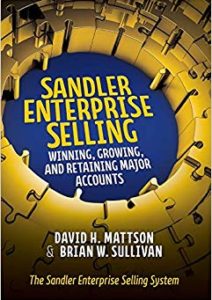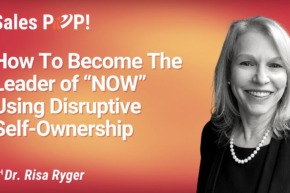Salespeople are optimistic by nature. They have to be, in a career where rejection is commonplace. However, it’s not always smart to go after every sales opportunity, especially when it’s a sale that utilizes a lot of resources. Brian Sullivan, interviewed by John Golden, discusses sales opportunity analysis for enterprise selling.
In this sales expert interview, Sullivan discusses:
- How to factor in resource allocation
- The ways to distinguish which sales to pursue
- Proper win-loss analysis
Big Sales Opportunity, Big Resource Utilization
With enterprise selling, there are a lot of resources that go into winning a deal. There is a lot of cost and opportunity cost associated when going after a massive sale. Many people focus on the substantial financial investment needed when trying to secure these high dollar sales. However, there is so much more that goes into it. It requires human assets – people with “day jobs” that have other priorities get pulled in to assist. They spend their time working on proposal development and chase of the sale, taking away time for their other responsibilities. You also put a toll on the organizational energy in general. “It’s a significant decision that you’re making because of all that you’re spending to go after it,” said Sullivan.
The Pursuit of the Sale
The pursuit of the enterprise sale is one that takes dedication and commitment on a large scale. Because of this commitment, it just isn’t possible to go after each opportunity. Sullivan recommends having a logical framework to follow, highlighting several areas to focus on before deciding to pursue a sale or not. This doesn’t mean taking six months off to figure out if you want to go after a deal or not. It makes coming together as a team to make a streamline decision on what is best to pursue and what isn’t.
Sale Selection and Win-Loss Analysis
Selecting deals can very much play into the win-loss analysis. When deciding to take on a potential transaction or not, Sullivan recommends examining three different areas of your business: selling team issues, client issues, and financing and contract issues. Considering these things will help determine if your company is stable enough to take on an enterprise deal, or if there is a significant amount of risk. There will always be some risk, but the goal is to make an educated decision, as a team, about pursuing or not pursuing a deal. “Having a process based on knowing and really calculating earns you the right to make good decisions,” said Sullivan.
Want more from Brian Sullivan? Check out Enterprise Accounts: Early Acceleration or Early Exit? and The Effective Win-Loss Analysis.
About our Host:
John is the Amazon bestselling author of Winning the Battle for Sales: Lessons on Closing Every Deal from the World’s Greatest Military Victories and Social Upheaval: How to Win at Social Selling. A globally acknowledged Sales & Marketing thought leader, speaker, and strategist. He is CSMO at Pipeliner CRM. In his spare time, John is an avid Martial Artist.









Comments